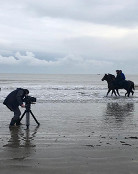Donn's Articles » Step by step
Step by step
May 5th is a date that is etched in most diaries these days, the date on which the latest set of Covid-19 restrictions are set to expire. Indeed, it is the only date left in lots of diaries.
Most other diary entries have been deleted or tip-exed out, swept away by the Covid-19 tsunami. Diaries that were chock-full of everything, important stuff, concerts and conferences and meetings and football training, were wiped clean. Wimbledon is off, the Dublin Horse Show is off, the Kaleidoscope Festival is off, the Simple Minds concert is off. Others, like the Rose of Tralee and Electric Picnic, will likely follow. And all sport. All racing.
Importance is relative.
The worry is that May 5th will not bring the easing of restrictions that many are anticipating. The danger is that it will.
Nobody knows at this stage. We are still 10 days away, and who knows what tomorrow will bring these days, not to mind next week.
With the passage of time comes the risk that the country’s mood will change. At the start of this, when the first draconian measures designed to impede the progression of the virus were introduced by the Irish government, there was an overwhelming feeling of solidarity. All in it together. In the country, even in the world. The virus that showed no discretion, that showed no respect for international frontiers or class divides. An indiscriminate attack on the people of the world, all over the world. On humanity. Nobody was safe. Nobody was immune.
Nothing unites like a common enemy.
Irish people hunkered down, guided by competent leaders and fuelled perhaps by fear as much as by a sense of national duty, the majority happy to do whatever needed to be done in order to arrest the march of the attacker. If that meant having a pint on Zoom (yes, we added Zoom to everyday speak) instead of in the pub, and revisiting basic long division, then that was the way it had to be.
The measures that the government put in place were swift and significant. The €203 special pandemic payment increased quickly to €350, the rent freeze, the ban on evictions.
It was always temporary though. None of it was ever sustainable even in the medium term.
There is a level of immunity building up all right: immunity to people’s plights. You hear the figures, you hear 77 deaths in one day and your first thought is of the trend, how does that compare, not of the human stories that are behind each death. You hear 936 new cases, and you think of the curve, not the people.
And if you haven’t contracted the virus yet, you are lulled into a sense that you won’t. The fear factor has been reduced.
Underlying all of this is the need and desire for people to get back to doing. There’s a human desire, a financial need. Blaise Pascal’s theory about man’s inability to sit quietly in a room alone has been tested and proven.
Consequently, patience is not as abundantly available as it was a couple of weeks ago. There are signs of unease. In order for a government directive or even the rule of law to operate effectively, you need compliance, and universal compliance is not a given now.
According to a recent government memo, details of which appeared in the Irish Times on Wednesday, it may be that, on May 5th, restrictions will be eased on some sections of the economy, but not on others. That makes sense. As mentioned before, it will be step by step. There will be no VE day, no day on which the war over Covid-19 has been won.
But just because it makes sense, it doesn’t mean that it will not be divisive. That it may not be the catalyst for a reduction in the sense of solidarity. The feeling of all-in-this-together.
According to David Nabarro of the World Health Organisation, the key is that, before restrictions can be eased, we need to be in a position to be able to defend ourselves against the building up of new outbreaks. That’s the importance of case finding and contact tracing. Our testing measures need to be efficient enough, firstly, to be able to quickly identify people who have the virus, and secondly, to get them to isolate quickly.
Of course, the panacea is a vaccine. An actual panacea. But a vaccine is still a distant dream on a faraway horizon. On the positive side, there is evidence from around the world that some sense of ‘normal’ life can operate in the interim, and that has to be the goal.
That said, the framework of Irish life is very different to the framework of other societies. The contact tracing measures that worked in South Korea, for example, could not work here.
What needs to be absolutely avoided is the premature easing of restrictions. It’s a balancing act, walking across a beam, slowly slowly, making progress. Then you see the end, but you run before you get there and you fall off before you reach it. You have to go back and start again. Better to continue with the baby steps, continue to progress, make haste slowly, until you are sure that you are at the point at which you can step off safely.
If restrictions were to be eased before the framework is in place to facilitate that, it would be catastrophic. In that instance, you would have to go back to square one and convince the people to go with you. And that would not be easy.
And all the restrictions, all the efforts that have been made to fight this virus over the past number of weeks, all the curtailed lives that have been lived, would be for nothing.
© The Irish Field, 25th April 2020


 Follow Donn
Follow Donn